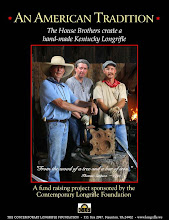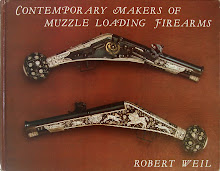The Scrimshaw art on it
reflects the style found in many period Cheyenne ledger books. I have a great
fondness for Ledger Book Art. Bent’s Fort was a fur trading post on the
mountain branch of the Santa Fe Trail where traders, trappers, travelers, and
the Cheyenne & Arapaho tribes came together in peaceful terms for trade, a
wonderful place to see and explore. Verse
found on horns of the F & I, and Revolutionary war periods. I took artistic
license and used it on a 1837 horn.
“Importance of dry
powder still applied.
Yes, it is so.”
This horn is about 16” long from tip to the back finial.
It features an aged medium yellow body, black throat &
high distressed black turned pine base plug. Scene shows Bent’s Fort as it
looked from 1833 into the early 1840s. Many tribes set up their lodges
around the fort during trading season. Also shown is an Indian on a Buffalo
hunt, where they would run the Buffalo and bring their horse dangerously close
to the animal they were hunting. My Maker’s mark, where it usually sits these
days on the back/bottom of the horn. The finial is a turned antler horn that’s
been highly aged, and the tip is also turned antler horn that I’ve stained and
aged as well. The base plug is held in place with brass pins/tacks that have
also been aged and the tip is held in place using small thin pins. It features
a high degree of engrailing design and scrimshawed art. The horn can be worn
either left or right, but is truly a left side horn.
“Initially I was concerned that the horn might not work. It had a lot of dark area’s throughout the body but I decided to give it a go and the horn worked perfectly."






































Very nice! I like everything about this horn.
ReplyDelete